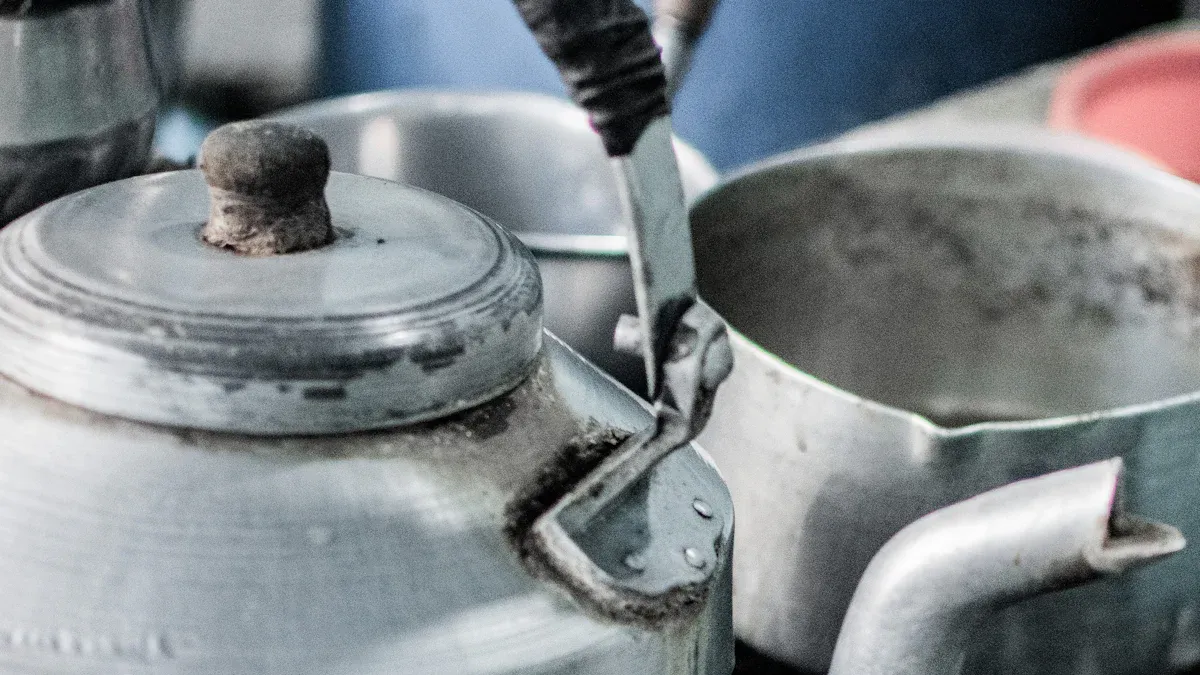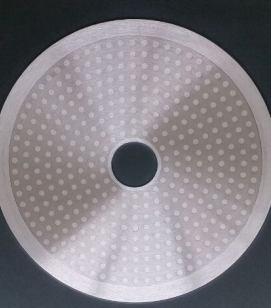
Aluminum cookware is a common sight in many kitchens. You might wonder about its safety. It is generally safe for most everyday cooking tasks. However, concerns do exist. These concerns become more important with untreated aluminum. They also arise when you cook acidic foods. An aluminum cookware factory (www.xianghai.com)produces many different types for various uses.
Key Takeaways
- Aluminum cookware heats fast and costs less. It can react with acidic foods. This may cause a metallic taste.
- Anodized aluminum is a better choice. It has a hard surface. This surface stops aluminum from getting into your food.
- You can choose other cookware. Stainless steel and cast iron are good options. They do not react with food.
Is Aluminum Cookware Safe for Everyday Use?
You probably have aluminum cookware in your kitchen. Many people wonder if it is truly safe for daily cooking. Let’s explore the facts about aluminum and your food.
Understanding Aluminum Leaching
Aluminum can move from your cookware into your food. This process is called leaching. Aluminum naturally forms a thin, protective layer on its surface. This layer is aluminum oxide. It helps prevent much of the aluminum from leaching. However, certain conditions can damage this layer.
When you cook acidic foods, more aluminum can leach. Think about tomatoes, lemon juice, or vinegar. High heat also increases leaching. Cooking food for a long time in aluminum pots can also cause more aluminum to enter your meal. You might notice a metallic taste in your food sometimes. This taste can be a sign of aluminum leaching.
Health Concerns with Aluminum
You might worry about aluminum and your health. Scientists have studied this topic for many years. Your body naturally takes in small amounts of aluminum every day. You get it from food, water, and even some medicines. Your kidneys are very good at removing most of this aluminum from your body.
For most healthy people, the amount of aluminum that leaches from cookware is very small. It usually does not pose a significant health risk. Early studies once linked aluminum to diseases like Alzheimer’s. However, current scientific research does not support a direct link between aluminum cookware and Alzheimer’s disease.
The World Health Organization (WHO) has set guidelines for how much aluminum you can safely consume. The amount you get from cooking in aluminum pots usually falls well below these limits. Still, if you have kidney problems, your body might not remove aluminum as effectively. In such cases, you should talk to your doctor about your concerns.
Advantages of Aluminum Cookware

Aluminum cookware offers many benefits in your kitchen. You will find it useful for everyday cooking. Let’s explore why many people choose aluminum.
Excellent Heat Conductivity
Aluminum pan is a fantastic heat conductor. You will notice your cooking Aluminum pan heats up very quickly. It spreads heat evenly across the entire cooking surface. This means your food cooks uniformly. You avoid hot spots that can burn your meal. This even heating helps you achieve consistent cooking results every time.
Lightweight and Easy to Handle
You will appreciate how light aluminum cookware feels. It is much lighter than cast iron or stainless steel. This makes it easy for you to lift and move pots and pans. You can handle them comfortably, even when full of food. Cleaning and storing them also becomes less of a chore.
Affordability and Accessibility
Aluminum cookware is very budget-friendly. You can buy good quality pieces without spending a lot of money. It is also widely available. You can find aluminum pots and pans in almost any department store or supermarket. This makes it an accessible option for every home cook.
Durability and Maintenance
Aluminum is a durable metal. It resists rust and corrosion well. You can expect your aluminum cookware to last a long time with proper care. Cleaning is usually simple. You can wash it by hand with soap and water. This low-maintenance aspect saves you time and effort in the kitchen.
Disadvantages of Aluminum Cookware

While aluminum cookware offers many benefits, you should also know its downsides. These drawbacks can affect your cooking experience and the quality of your food.
Reactivity with Acidic Foods
You will find that aluminum reacts with acidic foods. This chemical reaction can cause problems. Foods like tomatoes, lemon juice, vinegar, and wine are acidic. When you cook these in untreated aluminum pots, the metal can leach into your food. This leaching often gives your meal an unpleasant metallic taste. You might also notice your food changes color. For example, tomato sauce can turn a grayish hue. This reactivity means you should avoid cooking highly acidic dishes in plain aluminum cookware.
Potential for Staining and Discoloration
Aluminum cookware can easily stain and discolor. You might see dark spots appear on the surface. Sometimes, the metal can even pit, creating small indentations. This happens when you cook certain foods or use specific cleaning methods. For instance, boiling water with high mineral content can leave dark marks. Cooking eggs or certain vegetables can also cause discoloration. While these stains are usually harmless, they can make your cookware look old and unappealing. You might find it hard to keep your aluminum pots looking shiny and new.
Not Suitable for Induction Cooktops
You cannot use most aluminum cookware on induction cooktops. Induction cooktops work by creating a magnetic field. This field heats the cookware directly. Aluminum is not magnetic. Therefore, it does not interact with the magnetic field of an induction burner. If you have an induction stove, you will need cookware made from magnetic materials. These include cast iron or stainless steel with a magnetic base. This limitation means you cannot use your favorite aluminum pan if you switch to an induction cooktop.
However, right now there are many cookware can be impacted with a induction plate, to help the Aluminum cookware conduct magnetic .
Poor Heat Retention
Aluminum heats up quickly, but it also loses heat quickly. This means aluminum cookware has poor heat retention. Once you remove the pan from the heat, your food will cool down fast. This can be a disadvantage for certain cooking tasks. For example, if you want to keep a stew warm at the table, aluminum will not hold the heat well. You might find your food gets cold before everyone finishes eating. For dishes that benefit from sustained heat, like slow-cooked meals or keeping food warm, aluminum is not the best choice.
The Role of an Aluminum Cookware Factory in Quality
The quality of your aluminum cookware often starts at the source. An Aluminum cookware factory plays a crucial role in how well a pan performs. They decide the materials and the manufacturing processes. This directly impacts the cookware’s safety and durability. A good Aluminum cookware factory focuses on creating better products for you.
What is Anodized Aluminum
Anodized aluminum is a special type of aluminum. An Aluminum cookware factory creates it through an electrochemical process. This process makes the surface much harder. It forms a thick, protective layer of aluminum oxide. This layer is not a coating that can chip off. It is part of the metal itself. You get a stronger, more durable surface.
Benefits of Anodized Aluminum
You will find many benefits with anodized aluminum. It resists scratches and corrosion much better than regular aluminum. This means your cookware lasts longer. Anodized aluminum also reacts less with acidic foods. You will not get that metallic taste in your tomato sauce. It is also easier to clean. Many types offer non-stick properties. A reputable Aluminum cookware factory ensures these benefits. You can cook with more confidence.
Limitations of Anodized Aluminum
However, anodized aluminum does have some limits. It usually costs more than untreated aluminum. You might pay a higher price for these benefits. While durable, you should still avoid harsh scrubbing pads or metal utensils. These can damage the surface over time. Also, like regular aluminum, it is not magnetic. This means you cannot use it on induction cooktops unless it has a special base. An Aluminum cookware factory might offer different grades, so you should check the product details.
Safer Alternatives to Aluminum Cookware
You might want to explore other cookware options. These alternatives offer different benefits. They can also address some concerns you have about aluminum.
Stainless Steel Cookware
Stainless steel is a popular choice. You will find it very durable. It does not react with acidic foods. This means your food will not get a metallic taste. Cleaning stainless steel is also easy. Many pieces are dishwasher safe. You can use it for almost any cooking task.
Cast Iron Cookware
Cast iron cookware is very robust. It holds heat exceptionally well. This is great for searing meats or baking bread. With proper seasoning, it develops a natural non-stick surface. You can pass down cast iron pans for generations. It is a long-lasting option.
Ceramic Cookware
Ceramic cookware offers a non-stick surface. It is often made from natural materials. You will find it does not leach chemicals into your food. This makes it a good choice for health-conscious cooking. It heats evenly and is easy to clean.
Glass Cookware
Glass cookware is non-reactive. You can use it safely with all types of food. It is perfect for baking and storing leftovers. You can also see your food cooking through the clear glass. This helps you monitor your dishes easily.
Copper Cookware
Copper cookware heats up very fast. It also cools down quickly. This gives you excellent control over cooking temperatures. Chefs often prefer copper for delicate sauces. It looks beautiful in your kitchen too. However, you should choose lined copper to prevent reactivity.
Aluminum cookware offers benefits like affordability and quick heating. However, it reacts with acidic foods and can leach. Anodized aluminum reduces these concerns, giving you a safer option. You can also consider alternatives like stainless steel or cast iron for peace of mind. Your best cookware choice depends on your budget, cooking style, and health priorities.
FAQ
Is it safe to cook in aluminum pots every day?
Yes, it is generally safe for most uses. Your body handles small amounts of aluminum well. Avoid cooking highly acidic foods in untreated aluminum.
What foods should you not cook in aluminum?
You should avoid cooking acidic foods. These include tomatoes, lemon juice, and vinegar. They can cause aluminum to leach into your food.
Does anodized aluminum prevent leaching?
Yes, anodized aluminum significantly reduces leaching. It has a hardened, non-reactive surface. This makes it a safer choice for cooking.
Post time: Nov-07-2025

